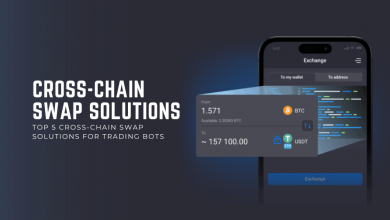Flutter vs. Kotlin Multiplatform: Which Technology Will Dominate Cross-Platform Development in 2025?
Valentin Telegin reveals why choosing the wrong framework could cost companies millions and shares his strategy for navigating the cross-platform revolution
When Flutter launched in 2017, few predicted it would challenge React Native’s dominance so quickly. By 2024, Flutter had captured 11.07% of the Android app market, while JetBrains’ Kotlin Multiplatform quietly emerged as the dark horse candidate. Now, with 87% of developers using cross-platform frameworks and the market approaching $104.61 billion in revenue for 2025, the battle lines are drawn. Companies report 30% cost savings with cross-platform development, but choosing poorly can doom a project before it launches.
Enter Valentin Telegin, who has witnessed this evolution firsthand. As Technical Director of Mobile Development at Rostelecom IT, he manages applications that collectively serve over 4.5 million monthly users: more than the population of several European countries. Rostelecom IT, a subsidiary of Russia’s largest telecommunications operator, employs over 4,000 IT specialists and captured first place in telecommunications revenue among Russian companies in 2021. The company’s projects are recognized as innovative and strategic for the entire telecommunications industry, earning recognition as a Laureate of the National Runet Prize 2022 in “Science, Technology and Innovation.”
What sets Telegin apart in this crowded expert field is his rare combination of hands-on implementation experience and industry recognition. He holds Senior Member status with IEEE (Institute of Electrical and Electronics Engineers), an achievement reached by only 10% of the organization’s 400,000 global members. Additionally, he serves on the program committee for CrossConf, the largest annual conference on cross-platform development trends, and is a member of the Association for Computing Machinery (ACM), the oldest and largest international organization in the computer field, uniting about 83,000 specialists.
The Million-Dollar Framework Decision
The stakes in cross-platform technology selection have never been higher. Companies implementing the wrong framework face cascading consequences: longer development cycles, higher maintenance costs, and limited scalability. Recent industry analysis shows that organizations choosing misaligned technologies spend 40% more on development while delivering products 6 months later than competitors using optimal frameworks.
“The decision isn’t purely technical – it’s strategic,” explains Telegin, who has implemented both Flutter and Kotlin Multiplatform technologies in enterprise-scale projects. “Companies need to consider their existing team expertise, long-term maintenance capabilities, and specific user experience requirements. There’s no universal solution.”
This technical complexity demands expertise that spans theoretical knowledge and practical implementation. Telegin brings both perspectives to the debate. His theoretical contributions include a recent publication in the International Journal “Eurasian Union of Scientists” with research on “Energy Efficiency in Mobile Application Development: Algorithms and Strategies,” addressing critical power consumption challenges as mobile devices become increasingly sophisticated. As the author of eight scientific articles, his research spans multiple aspects of mobile development optimization.
On the practical side, his implementation record speaks volumes. The mobile applications under his technical leadership at Rostelecom IT demonstrate real-world success at a massive scale. The company’s “Mobile Personal Account” serves over 4 million monthly users, while its “Smart Home” platform manages 300,000+ active users monthly. The “Smart Home” solution has achieved dominance in Russia’s home cloud video surveillance market with over 80% market share. Additionally, “Rostelecom Key” is a winner in the “UX/Usability” category at the Golden App competition, demonstrating the team’s commitment to user-centered design excellence.
International Recognition in Technology Assessment
The global technology community has increasingly turned to Telegin for critical evaluations. In 2025, he received an invitation to join the jury panel for the Globee Awards for Technology. This prestigious international recognition program has honored outstanding IT products and technological solutions worldwide since 2006. This appointment follows his established track record judging major technology competitions, including multiple years as a jury member for the Golden App Awards (2023-2024), the Digital Breakthrough hackathon, and the national Runet Prize (2023-2024), as well as the international Workspace Digital Awards-2024.
Beyond jury work, Telegin actively participates in international IEEE projects. As a member of the world’s largest technical professional association, he participates in the selection of candidates for the highest professional category of this authoritative association (2024, 2025). This role within IEEE demonstrates his standing among the global technical community and his expertise in evaluating professional excellence at the highest levels.
These judging roles require more than technical knowledge; they demand the ability to identify breakthrough innovations that will shape industry direction. The Digital Breakthrough hackathon, for instance, is Russia’s most significant national technological competition for the best digital industry specialists, operating as a flagship project within the presidential initiative “Russia – Country of Opportunities,” created in 2018.
His industry influence extends into professional development through multiple channels. This recognition was further solidified by his victory in the Digital Leaders Award 2023 competition in the “Best Developer” category, acknowledging his exceptional contributions to the field. As a special guest on the Mobius Channel, the primary YouTube resource for Russian-speaking mobile developers with 12,000+ subscribers, Telegin shared implementation insights comparing technologies from J2ME through modern Jetpack Compose and Kotlin Multiplatform solutions. He also serves on the program committee for the annual Mobius mobile development conference, helping select and refine presentations that shape industry discourse.
Flutter vs. KMP: The Strategic Framework Analysis
The technical community loves debating performance benchmarks and rendering engines. But Telegin has learned that technology choices succeed or fail based on business context, not GitHub stars.
“A financial application with strict security requirements might benefit from Kotlin Multiplatform’s ability to share business logic while maintaining native security implementations,” he explains. “Meanwhile, a content-focused app might leverage Flutter’s rendering consistency to deliver identical visual experiences across platforms.”
This isn’t theoretical for Telegin’s team. Take their “Rostelecom Key” application, a platform that manages everything from smart doorbell access to building security systems. The app swept the national Golden App competition in 2020: third place in “Real Estate Applications,” first place in “Best Usability/UX Application,” and the coveted People’s Choice award. Today, it handles security for over 250,000 monthly users across 276 Russian cities, riding a 70% annual surge in smart device adoption.
The success came from matching technology to purpose. Smart home applications need reliability over flashy animations, consistent performance across budget Android devices, and seamless integration with existing building infrastructure – exactly what their chosen development approach delivered.
The Technology Leadership Recognition
Professional recognition often reflects real-world impact. Telegin’s inclusion in the 2024 TOP-40 Digital Experts rating exemplifies this principle. While 4,000 specialists qualified for the main selection, only 10% advanced to the shortlist, and merely 1% reached the final top ranking. Each participant in this exclusive list represents an outstanding professional making significant impact on the digital industry’s development. Selected during a competitive process from January 13 to February 26, 2025, the award recognized his development of innovative mobile services including “Mobile Personal Account,” “Smart Home,” “Rostelecom Key,” and “Video Surveillance” platforms that became integral to millions of users’ digital lives while consistently earning national competition recognition.
“Being recognized among the top digital experts is not just personal achievement – it reflects the success of our entire team and the impact our applications have on millions of users daily,” reflects Telegin on the recognition.
Implementation Strategy for Enterprise Success
Successful cross-platform adoption requires more than technology selection; it demands a comprehensive implementation strategy. Organizations must evaluate existing team expertise, long-term maintenance capabilities, and integration requirements with legacy systems. The framework choice made today influences development capabilities for years, making strategic planning essential.
“The framework you choose today will influence your development capabilities for years to come,” emphasizes Telegin. “Teams need to consider not just current project requirements, but also their ability to adapt to future technological shifts.”
Market dynamics add urgency to these decisions. Companies implementing optimal cross-platform strategies report 50% faster time-to-market compared to traditional native development approaches. However, organizations choosing misaligned technologies often face technical debt that compounds over time, eventually requiring costly migrations or complete rebuilds.
The telecommunications industry provides compelling examples of both successful and failed cross-platform implementations. Applications serving millions of users like those under Telegin’s technical direction must balance rapid feature development with rock-solid stability. A single deployment failure can impact millions of users simultaneously, making technology choice critical for business continuity.
The Future of Cross-Platform Development
WebAssembly for mobile is still experimental. Progressive web apps remain niche. But Telegin sees these technologies converging with current frameworks in unexpected ways.
“We’re moving toward a future where cross-platform development isn’t just about code sharing – it’s about creating comprehensive development ecosystems,” he predicts. “The organizations most likely to succeed are those combining technical excellence with practical implementation experience.”
His team is already testing WebAssembly modules for computationally intensive features in their Smart Home platform. Early results show 40% performance improvements for real-time video processing tasks. It’s the kind of hybrid approach that might define the next generation of mobile applications.
The Flutter versus Kotlin Multiplatform debate will likely seem quaint in five years. By then, successful companies will be those that have learned to navigate technological transitions without losing sight of user needs. For Telegin, that means staying close to the 4.5 million people who depend on his applications daily, whether they’re checking security cameras, managing building access, or simply trying to pay their phone bill.



